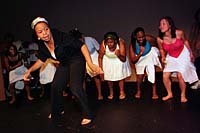

|
STUDENT LEARNING An early taste of university life opens doors and opportunities Making the unfamiliar familiar is proving to be a successful approach for steering students toward college careers. With help from the Madison Initiative, a variety of pre-college programs are encouraging young people to set their sights on UW-Madison – and reach for their dreams. BONNIE WILLIAMS IS AS POISED a young woman as a person could meet. A top student academically who aspires to a career in broadcast journalism, Williams is already gaining practical experience working on a locally produced television news program for young people. Next year, she is hoping to land an internship with a TV news department at a local network affiliate. A bright start indeed to a promising career – and Williams hasn't even graduated from high school. She is one of more than 200 middle school and high school students enrolled in the university's innovative pre-college summer academic enrichment program known as PEOPLE. Now in its second year, the program helps minority and economically disadvantaged students from Madison, Milwaukee and Racine acquire the skills, information and resources needed for college. It is also a major component of Plan 2008, the university's comprehensive initiative to increase campus diversity. Broadening student learning opportunities through programs such as PEOPLE is one of the Madison Initiative's top areas of focus. Thanks to these successful UW-Madison pre-college programs, students can take advantage of opportunities long before they ever attend their first university lecture. Williams has spent three weeks on campus during the last two summers as part of the PEOPLE program. She lived in a campus residence hall, and during the day she was immersed in writing assignments, science experiments and computer projects. During the evenings, she spent time with fellow participants in organized social events. PEOPLE students also take part in enrichment academic programs and workshops throughout the year in their public schools. Williams says it's been time well spent. "It's definitely an experience you need as a high school student to help prepare you for college," says Williams, a junior at Rufus King High School in Milwaukee. "In high school, most people act totally different and are trying to impress their friends. In the PEOPLE program, you end up being yourself because you are away from home. You make friends with people you didn't even know before you started." Williams may actually snag that journalism internship through the PEOPLE program next summer. In the meantime, she continues her work with Teen Focus, a TV news program produced by high schoolers in Milwaukee. Current research indicates that of minority students who actively participate in Wisconsin pre-college programs, 98 percent graduate from high school and 70 percent pursue post-secondary education, says Cleveland James, UW-Madison associate director of undergraduate admissions who helped develop PEOPLE. "With this in mind, our hope is that PEOPLE will further increase the pool of qualified minority college students," he says. The incentive to stay in the program is a strong one: Each PEOPLE student admitted to UW-Madison after graduating from high school is eligible for a need-based or merit-based tuition grant for up to five years. The program's goal is to increase the number of minority students graduating from UW-Madison each year, so they can return to their communities and assume leadership positions in business, community and government organizations. So far, the future looks promising. A survey of the inaugural class found that nearly all of the participants would recommend the program to another student. Follow-up evaluations with parents revealed that a majority of students were enthusiastic and excited after attending. Williams says the program's name first attracted her to PEOPLE, which stands for Pre-College Enrichment Opportunity Program for Learning Excellence. And once attracted, she is now motivated to do well in her high school studies so she can succeed in college. "The program is giving me something to look forward to after I graduate high school, so I can do the work and get ahead in life," she says.
|

A balance of social time and academics gives participants of the PEOPLE program an early taste of the college experience. The summer program's agenda included evening rehearsal time for a final song-and-dance theater performance.
Related links: Pre-college programs (Division of Continuing Studies) |
|
Table of contents | Chancellor's special reports | UW Home | Feedback |
|
|